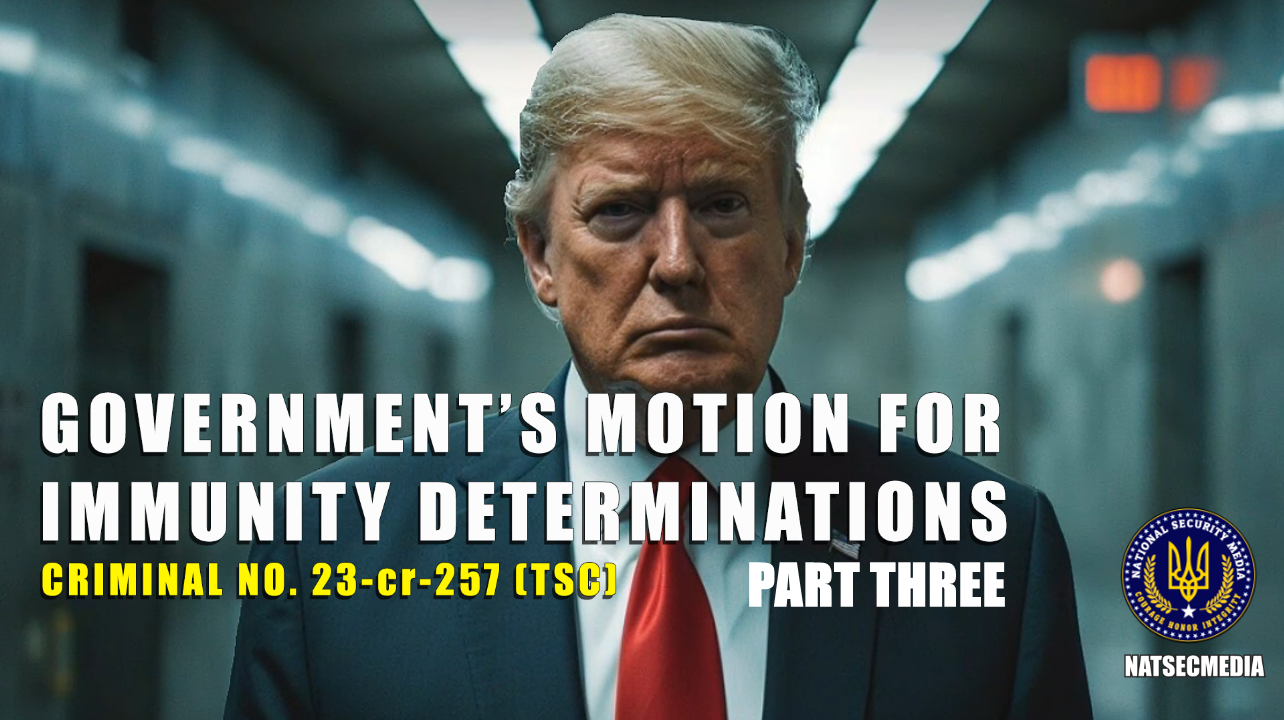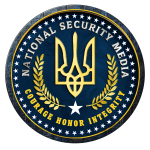UNITED STATES OF AMERICA v. DONALD J. TRUMP,
Defendant. * * * * * * * *
CRIMINAL NO. 23-cr-257 (TSC)
GOVERNMENT’S MOTION FOR IMMUNITY DETERMINATIONS
1. The interactions at issue were unofficial
2. Even if the defendant's contacts with state officials were official, the Government can rebut the presumption of immunity
1. The statements at issue were unofficial
a. SPEECHES
i. Dalton, Georgia, on January 4, 2021 (supra p. 68)
ii. The Ellipse on January 6, 2021 (Superseding Indictment, ECF No. 226 86; supra pp. 75-78)
b. TWEETS
i. Tweets, as candidate, casting doubt on election integrity
ii. Tweets making false claims of election fraud
iii. Tweets and re-Tweets attacking those speaking the truth about the election
(a ) ALSCHMIDT (Superseding Indictment, ECF No. 226 41; supra p. 38)
(b) CHRISKREBS (Supra pp. 45)
(C) RUSTYBOWERS and Pennsylvania legislators (Superseding Indictment, ECF No. 226 21, 43; supra pp. 20, 40)
(d) BRIANHAGEDORN (Superseding Indictment, ECF No. 226 46; supra p. 41)
(e) Governor DOUGDUCEY Governor BRIANKEMP and Secretary of State RAFFENSBERGER (supra pp. 18, 26-31)
iv. Tweets exhorting individuals to travel to Washington, D.C., for the Save America Rally (Superseding Indictment, ECF No. 226 68, 72, 79(b); supra pp. 60, 64, 71-73)
v. Tweets regarding Pence's role on January 6 (Superseding Indictment, ECF No. 226 4 69, 79(a), 82; supra pp. 61, 71-73)
vi. The defendant's 2:24 p.m. Tweet on January 6 (Superseding Indictment, ECF No. 226 94; supra pp. 80-81)
c. OTHER PUBLIC STATEMENTS
2. In the alternative, any official portions of the defendant's public speeches, Tweets, or statements should be excised
Playlist

0:16

0:16

0:16
The defendant asserts that he is immune from prosecution for his criminal scheme to overturn the 2020 presidential election because, he claims, it entailed official conduct. Not so. Although the defendant was the incumbent President during the charged conspiracies, his scheme was fundamentally a private one. Working with a team of private co-conspirators, the defendant acted as a candidate when he pursued multiple criminal means to disrupt, through fraud and deceit, the government function by which votes are collected and counted—a function in which the defendant, as President, had no official role.
In Trump v. United States, 144 S. Ct. 2312 (2024), the Supreme Court held that presidents are immune from prosecution for certain official conduct—including the defendant’s use of the Justice Department in furtherance of his scheme, as was alleged in the original indictment—and remanded to this Court to determine whether the remaining allegations against the defendant are immunized.
The answer to that question is no. This motion provides a comprehensive account of the defendant’s private criminal conduct; sets forth the legal framework created by Trump for resolving immunity claims; applies that framework to establish that none of the defendant’s charged conduct is immunized because it either was unofficial or any presumptive immunity is rebutted; and requests the relief the Government seeks, which is, at bottom, this: that the Court determine that the defendant must stand trial for his private crimes as would any other citizen.
This motion provides the framework for conducting the “necessarily factbound” immunity analysis required by the Supreme Court’s remand order. Trump, 144 S. Ct. at 2340. It proceeds in four parts.
SECTION 1
Section I provides a detailed statement of the case that the Government intends to prove at trial. This includes the conduct alleged in the superseding indictment, as well as other categories of evidence that the Government intends to present in its case-in-chief. This detailed statement reflects the Supreme Court’s ruling that presidential immunity contains an evidentiary component, id., which should be “addressed at the outset of a proceeding,” id. at 2334.
SECTION 2
Section II sets forth the legal principles governing claims of presidential immunity. It explains that, for each category of conduct that the Supreme Court has not yet addressed, this Court should first determine whether it was official or unofficial by analyzing the relevant “content, form, and context,” id. at 2340, to determine whether the defendant was acting in his official capacity or instead “in his capacity as a candidate for re-election.” Blassingame v. Trump, 87 F.4th 1, 17 (D.C. Cir. 2023). Where the defendant was acting “as office-seeker, not office-holder,” no immunity attaches. Id. (emphasis in original). For any conduct deemed official, the Court should next determine whether the presumption of immunity is rebutted, which requires the Government to show that “applying a criminal prohibition to that act would pose no ‘dangers of intrusion on the authority and functions of the Executive Branch.’” Trump, 144 S. Ct. at 2331-32 (quoting Nixon v. Fitzgerald, 457 U.S. 731, 754 (1982)).
SECTION 3
Section III then applies those legal principles to the defendant’s conduct and establishes that nothing the Government intends to present to the jury is protected by presidential immunity. Although the defendant’s discussions with the Vice President about “their official responsibilities” qualify as official, see Trump, 144 S. Ct. at 2336, the Government rebuts the presumption of immunity. And all of the defendant’s remaining conduct was unofficial: as content, form, and context show, the defendant was acting in his capacity as a candidate for reelection, not in his capacity as President. In the alternative, if any of this conduct were deemed official, the Government could rebut the presumption of immunity.
SECTION 4
Finally, Section IV explains the relief sought by the Government and specifies the findings the Court should make in a single order—namely, that the defendant’s conduct set forth in Section I is not immunized, and that as a result, the defendant must stand trial on the superseding indictment and the Government is not prohibited at trial from using evidence of the conduct described in Section I.
